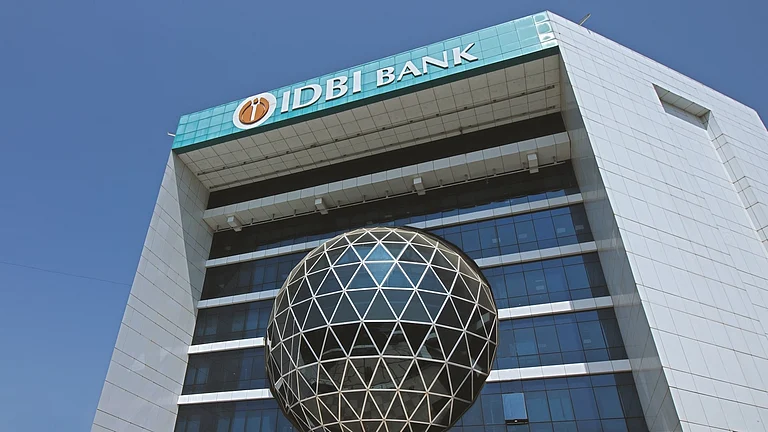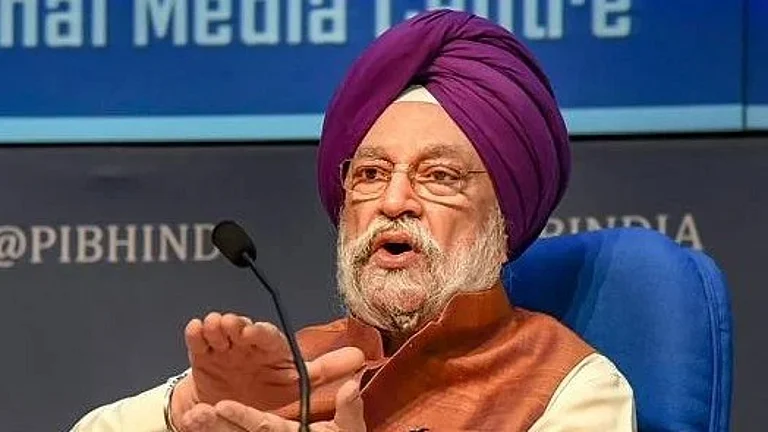An anti-corruption crusader gets entwined in a conflict-of-interest scandal.
The story could be stuff of Greek tragedy but is playing out in the life of Madhabi Puri Buch, the chairperson of the Securities and Exchange Board of India (Sebi).
The chief of India’s markets regulator was once the apple of the aspirational nation’s eye. She is the first woman to lead Sebi, the youngest, and the first person from the private sector to become the regulator’s chief—all the qualities ‘new India’ seeks.
But things have fallen apart too soon.
In only the past two months, the Sebi chief has been accused of having a conflict of interest in the regulator’s probe into the Adani Group, politicians have claimed she drew salaries from companies while at the Sebi chief’s post and people working at Sebi have complained against her for fostering a toxic work environment.
Although no legal case has been made out against her, Buch’s unblemished reputation has taken a hit as has the integrity of the capital markets regulator.
Out of IIM, Buch Did Not Seek a Job
Buch graduated from the Indian Institute of Management (IIM) in Ahmedabad, India’s top business school, in 1988. Her batchmates say she was the only graduate to pull out of the placements process. In 1989, she joined ICICI Bank but worked there only a few months. She subsequently moved to the UK as a lecturer. In 2006 she joined ICICI Securities and eventually rose to become the company’s chief executive.
In 2017 she became a whole-time director of Sebi. The very next year she ordered the beleaguered Sahara Group to return Rs 14,000 crore it had raised through fully convertible debentures. In May 2021 she passed an order against two people for sharing unpublished price-sensitive information about energy company Deep Industries on social media. These orders positioned her as an anti-corruption crusader.
As Chief of the Markets
On March 1, 2022, she took over as Sebi chief, the youngest ever, when the regulator was facing heat for its (mis)handling of governance lapses at the National Stock Exchange (NSE). Buch dealt with these issues head on. She went after platforms peddling unauthorised investment advice. In the aftermath of the coronavirus pandemic, she took swift action against the rising tide of finfluencers.
In May last year Sebi banned YouTube finfluencer PR Sundar from providing financial advice for a year in one of the first major moves against fin-fluencing. Sundar was also made to pay a fine of around Rs 6 crore.
Buch introduced the business concept of key result areas (KRAs) into the regulator’s everyday operations to streamline priorities and worked on building immunity against frontrunning, information asymmetry, insider trading, fraud transactions, stock price manipulations and inadequate disclosures. Again, it was Buch who formed an advisory panel for environmental, social and governance (ESG) parameters pertaining to the securities market.
In an unexpected move for a markets regulator bent on bringing in retail investment, Buch surprised everyone when she came out and said there was “froth” in small- and mid-cap stocks. She flagged “irrational exuberance” and made mutual funds disclose stress test outcomes—tests that determine the time needed to liquidate investments.
‘I Just Don’t Give Up’
People who have worked with Buch or have seen her operations from close quarters say she is meticulous, pays attention to detail and delves into granularities before making important decisions. A former colleague of the Sebi chief told Outlook Business earlier that Buch “understands the pulse of the market and knows what needs to be prioritised”. “Her quick decision-making ability makes her the perfect boss,” says the former colleague.
But Buch, by her own admission, is a difficult boss to work with. Earlier this year, speaking at IIM-A, Buch said, “I have a long list of colleagues as well as bosses who will testify to the fact that I am not only a very difficult boss to work with but an almost impossible subordinate to work with because I just won’t give up until a problem has been dissected to the last degree.”
Her managerial process, of late, seems to have rubbed her subordinates the wrong way. Nearly 1,000 officers of Sebi, mostly grade A and above, wrote to the Union Ministry of Finance on August 5 complaining Buch uses “harsh and unprofessional language” toward team members, monitors “minute-by-minute movement” and imposes “unrealistic work targets with changing goalposts”.
When Credibility Comes into Question
The complaints from Sebi colleagues came days after a report by US-based short seller Hindenburg Research which accused her and her husband Dhaval Buch of having stakes in offshore entities used in what it calls the “Adani money siphoning scandal”. The short seller claimed Sebi did not take worthwhile action against the Adani group 18 months after it accused the Gujarat-based conglomerate of running “the largest con in corporate history”. And for Sebi’s inaction, it blamed Buch.
Sebi refuted Hindenburg’s claims and said Buch had made necessary disclosures and that the “chairperson has also recused herself in matters involving potential conflict of interest”. Buch and her husband, in a joint statement, denied Hindenburg’s allegations calling them an attempt to assassinate their character in response to enforcement action against the short seller.
And soon after, Pawan Khera, a leader of the Congress party, accused Buch of accepting Rs 17 crore in salaries from ICICI Bank after she took over as Sebi chief. The bank denied, saying she had not been paid anything apart from retirement benefits.
Buch has also been accused of receiving rental income from a company called Carol Info Services, a company linked to Wockhardt—a firm under Sebi’s scanner. Congress has alleged that Buch’s husband received Rs 4.78 crore in income from Mahindra & Mahindra while she was arbitrating cases related to the group.
The company has called the allegations “false and misleading” and said that compensation was provided to Dhaval Buch only for his supply chain expertise and management acumen. Dhaval Buch serves on the board of Bristlecone, a supply-chain consultancy company which is a subsidiary of Mahindra & Mahindra, the company said in its statement.
The Congress has further alleged that Buch holds 99% stake in consultancy firm Agora Advisory “which has been actively providing advisory/consultancy services till date”. Hindenburg Research, on September 11, said in a post on X: “New allegations have emerged that the private consulting entity, 99% owned by Sebi chair Madhabi Buch, accepted payments from multiple listed companies regulated by Sebi during her time as Sebi whole-time member. The companies include: Mahindra & Mahindra, ICICI Bank, Dr. Reddy’s and Pidilite.” The short seller group further said that Buch has “maintained her complete silence on all emerging issues”.
The Importance of Being Earnest
The wave of allegations, coupled with the unrest inside Sebi have led to serious questions being raised about Buch’s sense of integrity. While none of the allegations have legal bearing yet, regulation is also a perception game. It was Buch’s perception as a no-nonsense taskmaster intent on fighting corruption that led to her successes at Sebi. Without that Buch loses her credibility as does Sebi.
This is not the first time Sebi’s integrity has faced questions. Back in 2007, Sebi indicted National Securities Depository Limited (NSDL) in a Rs 500 crore multiple demat accounts scam. The markets regulator had found that thousands of demat accounts were opened in a single name which were then used to corner shares worth hundreds of crores in initial public offers (IPOs), according to a Businessworld report. At the time, the chairperson of NSDL was Chandrasekhar Bhaskar Bhave. The same Bhave became chairperson of Sebi in 2008 while Sebi was probing NSDL for the alleged scam, the report cited above claims. But the United Progressive Alliance (UPA) government of the day allowed Bhave to complete his term.
The episode had considerably dented Sebi’s public image. Buch, when she took over, was charged with cleaning up Sebi’s image which many believed had suffered over the years. And she did, to a large extent. It is under her as captain of Sebi that a record number of Indians joined the stock markets. A big enough dent on Sebi’s image thus has the potential for calamitous market reaction.
Former Economic Affairs secretary Subhash Chandra Garg, writing for The Quint, says Buch’s brazenness in the face of mounting allegations will hurt her, Sebi and the government. Garg believes, “If there are any chinks in her armour, the most honourable course for Ms. Buch is to step down.”
He further says, “While Ms. Buch has accused Hindenburg of character assassination, she has remained uncharacteristically silent on the recent allegations.”
There are still nearly three years to go before Madhabi Puri Buch finishes her term as Sebi chief. In the markets, three years is a long time. Buch’s complete silence on the allegations raised by Congress has raised eyebrows. The chief of the capital markets is stuck in a quagmire. But quagmires aren’t entirely new to Buch. On November 26, 2008, the day of the Mumbai terror attacks, she was inside the Taj Mahal Palace Hotel, along with her husband attending a Unilever board meeting. She survived that. Can she survive this?
































